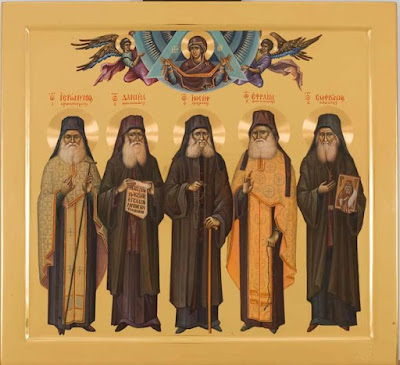Icon of our Venerable Father Sophrony of Essex (source)
Note: This is a pious reflection by a layman on the joy being experienced at the newly-announced upcoming canonization of new Saints of our Church. In a world with so much pain, sorrow, suffering and hatred (along with painful divisions among Orthodox Christians), we are thankful for these tokens of joy given by our Lord. We pray that these new Saints will entreat Him that peace be granted to the whole world, and especially that all hatred, divisions and animosity be dissolved between Orthodox Christians, and that we all might be granted love, humility, peace and unity in the Holy Trinity!
A joyous reflection on the Newly-canonized Saints
It feels like this is a festival without end--the joy of Pascha--which was given to us as a"mouth" and "voice" and expression of the Church by our Ecumenical Patriarch Bartholomew!
These announcements allow us to see a bit of heaven through the pure eyes and sweet hearts of our new Saints!
And this vision full of fruit is not from an individual!
It is in common, it is of the Church!
Many years to you, All-holiness! Fervent thanks!
Another spiritual father of ours, another radiant and true seeker of the truth, a delicate and gracious character, a cultivator of the spiritual life, a poet of the Divine Spirit, a universal and ecumenical rector of the teaching of Orthodox spirituality, the Athonite (cenobite, ascetic, confessor and spiritual father), the Russian, the Patron of Essex as the founder of the Holy Monastery of the Precious Forerunner, the Hieromonk, the Archimandrite Father Sophrony (Sakharov) is "consecrated" formally as a Saint of our Church!
We confess that we are experiencing unique moments!
"It is good for us to be here!"
Within this resurrectional atmosphere and joy!
The Saints show us and reveal to us how death was conquered!
They lived the Resurrection, during this life! Not [only] after their dormitions!
We are truly experiencing a Pascha--more properly, many together--in the face of every Saint of ours, as a victor over death!
And of course, this is occurring before the Autumn Pascha,
the feast of St. Demetrios, which his
hometown of Thessaloniki celebrates together with the Most-holy Theotokos!
Thus, with those eternal Children--"those to whom belongs the Kingdom of Heaven", our new Saints, from the Garden of Panagia, will shine especially this year within this Pascha and festal atmosphere. (We sense that our new Saints will stand beside us at the procession of the Holy Relics and the Icon of the Great Martyr and Myrrhstreamer St. Demetrios, throughout the radiant streets of Thessaloniki, together with those who are celebrating together, this year along the Panagia Soumela of Pontos.)
Because of this, amidst the autumn we could say:
"Today it smells of springtime, and new creation dances!"
The heaves are rejoicing together with us!
The heavens and the earth are united through our new Saints!
It seems like everything is occurring easily and speedily, beautifully, very spacious and beautiful!
And let beauty save the world! Our Saints!
The stars that illumine our darkness--internally and externally--with the Uncreated Light, which they experienced, tasted, lived!
They are our neighbors, who approach and stand in heaven!
Our fathers, our inspirers, and our guides!
Our mediators and intercessors!
And we don't know if they are gifts from Heaven to the earth, or from earth to Heaven! They may be both!
Once again, let us remember the names of our new Saints,
mentioned previously, and how even this serves as a guide of noetic prayer:
The Venerable Daniel of Katounakia, Monk
The Venerable Joseph the Hesychast, Monk
The Venerable Ieronymos of Simonopetra, Hieromonk,
The Venerable Ephraim of Katounakia, Hieromonk,
The Venerable Sophrony of Essex, Hieromonk!
A beautiful icon depicting the five Athonote Fathers that were canonized together at the same time by the Ecumenical Patriarchate: (left to right) Sts. Ieronymos of Simonopetra, Daniel of Katounakia, Joseph the Hesychast, Ephraim of Katounakia, and Sophrony of Essex (
source)
And we will not shy away at this time from remembering those other newly-canonized Saints:
The Venerable Porphyrios of Kavsokalyvia, Hieromonk
The Venerable Paisios, Monk!
In reality, we sense that we are partaking of a surpassingly radiant Athonite festival, with all of the
polyeleoi of the Monasteries, Sketes, Kathismas, Cells, Kalyves encircling with joy and illumines, while the Fathers, full of rejoicing, chanting together and harmoniously:
"It is meet and right", "It is meet and right", "It is meet and right!"
And of course, they are celebrating full of light and with heavenly thoughts and good works lightning with grace even the Athonite dens and caves, the makeshift, temporary and insignificant dwelling-places and adornments of ascetics and hermits...
And this occur with the unseen ranks of naked hermits, adorned, extraordinarily, with raiment shining with light!
The Light of Christ illumines all!
New Saints of the Church!
Fathers, teachers, and preservers of the World!
We owe them very much!
Our lives!
Intercede for us!
Or, another way: Stand besides us!
And note:
The dark and inhumane and criminal 20th century seems to become more humane from the light of so many auspicious Saints of the Orthodox Church!
Most likely, all of these Saints of the 20th Century serve as confirmation that: "where sin abounds, grace super abounds!"
And we live this fullness of grace through our Saints in our days!
Christ is risen!
-by Stelios Koukos
(
source)
Icon of the New Choir of Venerable Athonite Fathers: Joseph the Hesychast, Ephraim of Katounakia, Porphyrios of Kavsokalyvia and Paisios the Athonite (source)
Through the prayers of our Holy Fathers, Lord Jesus Christ our God, have mercy on us and save us! Amen!


.jpg)

.jpg)



























